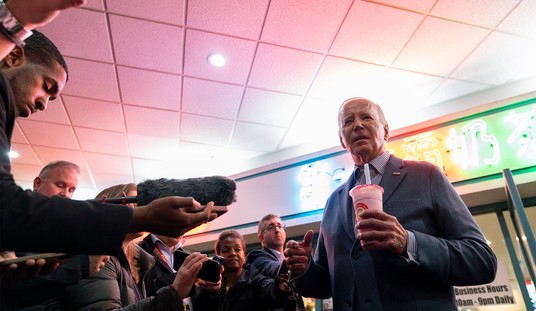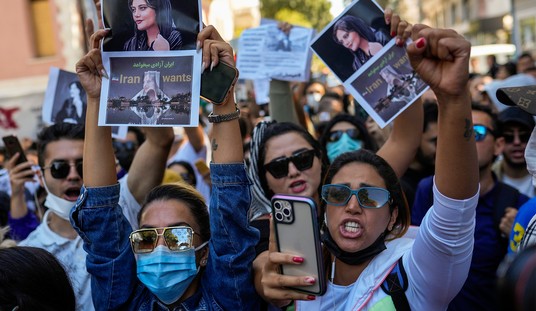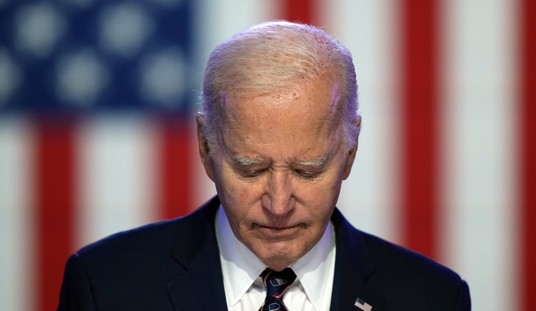I don’t believe that economic misery brings down regimes. The pidgin Marxism that passes for serious analysis among all too many of our deep thinkers would have us believe that misery causes all manner of violence, from terrorism to revolution. Whenever I hear somebody say that “if you lived as miserably as they do, you’d be a terrorist too,” I want to remind the pundit in question that there’s no terrorism to speak of in North Korea or Cuba, where misery abounds, and such terrorism as does exist in Russia is often credited to Putin’s Chekist tactics, not to a primal scream of suffering people.
Indeed, I can make a strong case for the opposite hypothesis: that resistance to tyranny grows as economic conditions improve. Revolution is not an act of desperation, it’s an act of hope.
All of which is to encourage policy makers to concentrate on the political/military dimension, not the economy of our various enemies. Take Iran, for example. It’s generally claimed–above all, by those who are unhappy about it–that living conditions are improving, largely because of the easing of Western sanctions. I’m not sure that’s correct, mind you (I think most Iranians are bad off, and maybe even worse off than they were a year ago), but if it is, the current internal turmoil undermines the misery-breeds-revolution model. Of late, the already significant level of political protest has grown, and public anger at the regime has, if anything, intensified.
The most surprising evidence of rising political protest comes from the Green Movement, which most Western analysts have written off as a failed effort at regime change. Its leaders, Mir Hossein Mousavi and Mehdi Karroubi, have been under house arrest for nearly four years, yet they remain powerful enough to deter the regime from either trying or executing them. Indeed, that Supreme Leader Ali Khamenei and the various chieftains of the Rouhani government fear the Greens is confirmed by recent accusations against Mousavi and his wife. Nobody’s likely to believe the accusations, since Mousavi was out of politics for twenty years before the 2009 presidential election campaign.
Even more surprising, Mousavi was able to deliver a stinging rebuttal.
From the onset of our house arrest my wife and I have repeatedly informed the authorities [via our prison guards] of our readiness to stand trial in an impartial and public court of law,” Mousavi stated, adding: “I stand before you ready to respond to the false allegations against me and to expose the source of the extensive corruption that has engulfed our nation and our revolution.
Which gets to the essence of the matter: it’s not the misery, but the corruption that angers the people. And there are enough angry people to enable Mousavi to make his first political statement since he was arrested. This suggests a lack of regime self-confidence; if they can’t even silence the leader of the opposition, their control is very much in question.
It’s what you should expect from a regime that is fighting on multiple fronts, including Iraq, Syria, Yemen, Lebanon and Africa, including Nigeria. And unlike its well-established practice of inducing foreigners to die for Iranian interests, the regime now commands a potent Iranian fighting force abroad, and some of those fighters are coming back in coffins. There’s the recent case of a Revolutionary Guards brigadier general killed in Iraq (ironically by an IED, not, as reported, by a sniper), along with six other RG officers. According to the Washington Post, there are roughly a thousand Iranian “advisers” in Iraq, helping in the fight against ISIS. Nor does the Post seem to know that there are also more than ten thousand Iranian fighters in the battle, many of whom are smuggled home without fanfare, and whose families are told not to talk about it.
There are similar numbers of Iranian fighters (mostly Hezbollahis) in Syria, in keeping with Khamenei’s orders that no expense and no effort be spared in order to save Assad’s regime. Here, too, the casualty numbers are mounting, and the families back in Lebanon don’t like it any more than the Iranian people do.
Nor does the bad news stop there. Resistance continues from various Iranian tribes, notably the Balouch. Three more Iranian security forces were recently killed, and there is little reason to believe the violence will diminish in the near future.
All this fighting, on the ground and through the airwaves, is part of a struggle for power after the death of the supreme leader. If you want to understand Rouhani, that’s the proper context: he wants to succeed Khamenei, and needs support from all the forces in play, from the Guards to the clerics, from the Bazaar to the intelligence organizations, from the Ahmadinejad crowd to the religious fanatics around the followers of the 12th Imam. He is wooing them all. So when Rouhani’s apologists tell you that he’s having a really tough time instituting positive reforms because of the “hard-liners,” have a good chuckle. He’s sharing a very uncomfortable bed with them.
Finally, if you understand what’s going on inside the failed regime of Ali Khamenei, you’ll see why the various entreaties from the White House are totally dissonant. Such a regime doesn’t want to make a deal with the Great Satan; it is pushing hard for victories on the ground throughout the region, and elsewhere as well. Khamenei and Putin are in total agreement about the desired shape of the world they are trying to create: a marginalized America, a hegemonic control over Iran, Iraq, Lebanon and Syria, some miracle for Venezuela and Cuba (the Iranians read the Cuban deal as further proof that intransigence works with Obama) and, needless to say, the downfall of the royal family in Saudi Arabia.
If we had a foreign policy team worthy of us, we’d be supporting the Iranian opposition, but Obama has proven that he prefers Khamenei to Mousavi.
Which disgusts the Iranian people, and should disgust us. Maybe something worthwhile will come from the new Congress? And not just sanctions. The central issue is political/military.








Join the conversation as a VIP Member